Many students find IELTS writing the most challenging part of the exam. Well, it’s indeed challenging! In addition to checking grammar and vocabulary, it also evaluates your ability to present and support your position. It is similar to other written assignments students face throughout their college path. However, there are some specific rules and ideas for IELTS topics you need to know to succeed.
So, explore our guide! Written by the IvyPanda team, it explains the essay structure and recommends some useful IELTS writing books. Also, you will learn the basics of academic style and find tools to practice your essay writing.
📒 7 Best IELTS Writing Books
Let’s start by exploring the recommended preparation materials. While developing this study guide, we were relying on these books. They are helpful, so we advise you to get familiar with them. You will also find various exercises to enhance your writing skills.
The best practice books for IELTS writing are as follows:
This is an ultimate guide that will help you achieve a band score of 8+ without any struggles. The book includes top strategies for IELTS writing task 1 and task 2. The author believes that just 10 minutes of practice a day will lead to outstanding results. The unique and effective strategies and formulas presented in the book will help to reach success.
This Cambridge edition book will become your guide to the world of grammar rules, essential for the IELTS test. The book will be useful for both Academic and General Training. Also, there are two versions: IELTS writing book with answers and without them.
Do you feel like your lexicon is insufficient? Do you forget words or cannot find suitable synonyms? Then, this book is what you need. Read it, enrich your vocabulary, and confident about your English skills.
The author created an entire series of books for IELTS preparation. There are four of them (Reading, Listening, Speaking, and Writing). Read them together to apply a complex preparation approach. Or choose the ones that you need. The writing part contains many valuable insights, so it is one of the best IELTS writing books for self-study.
Barron’s IELTS writing book is your perfect assistant with exam preparation. The book has four key focuses:
- vocabulary enhancement;
- task achievement;
- the improvement of coherence and cohesion;
- grammatical accuracy.
Such a complex approach to IELTS writing part preparation guarantees outstanding results.
It is a general IELTS preparation book with an excellent explanation for the writing part. Regardless of what exam you plan to take (Academic or General), consider studying this manual. And a delightful bonus: there are some free samples available on the website. Find this IELTS writing book online right now.
In case you look for a comprehensive book that would explain all aspects of the writing part of the exam, consider this option. The IELTS writing book is for academic and general formats. It includes numerous materials, tips and prompts, IELTS essay topics, and even a grading rubric.
💻 IELTS Writing Practice Online
To use the theoretical knowledge from the IELTS writing books, it is essential to practice each task. We can offer our help with that as well.
Take a look at our list of free IELTS practice materials:
- IELTS.org is an official IELTS website with a full range of preparation materials. Here you will find a clear description of each part and a lot of practical tasks. If you are looking for a resource that would contain all the necessary practice materials, IELTS.org should be your choice.
- Canada Visa is another useful source that will help you to pass IELTS successfully. The website was initially designed for those who are planning to migrate to Canada. However, due to the richness of its practical tasks, it will help anyone who is preparing for the exam.
- IELTS-Exam is your perfect guide throughout your preparation path. It will teach you how to follow the IELTS essay format, explain the difference between writing tasks 1 and 2, and, of course, present some essay samples.
📝 IELTS Writing Task 1
As stated in every IELTS writing book, task 1 of the writing module weighs only 33% of the total writing score. It is also worth mentioning that this part differs for Academic and General Training types.
See the comparison in the table below:
Below, we dive deep into the aspects of IELTS Academic and General writing tests. You will find many tips on IELTS essay structure, the use of grammar and vocabulary, coherence and cohesion, and a lot more.
💌 General Writing Task 1
Let’s start with writing task 1 for General Training. Here, you will have around 20 minutes to compose a letter of at least 150 words.
You will be graded by the following criteria:
- Task achievement – 25%
- Grammar – 25%
- Vocabulary – 25%
- Coherence and cohesion – 25%
An IELTS essay structure for General Writing Task 1 should look like this:
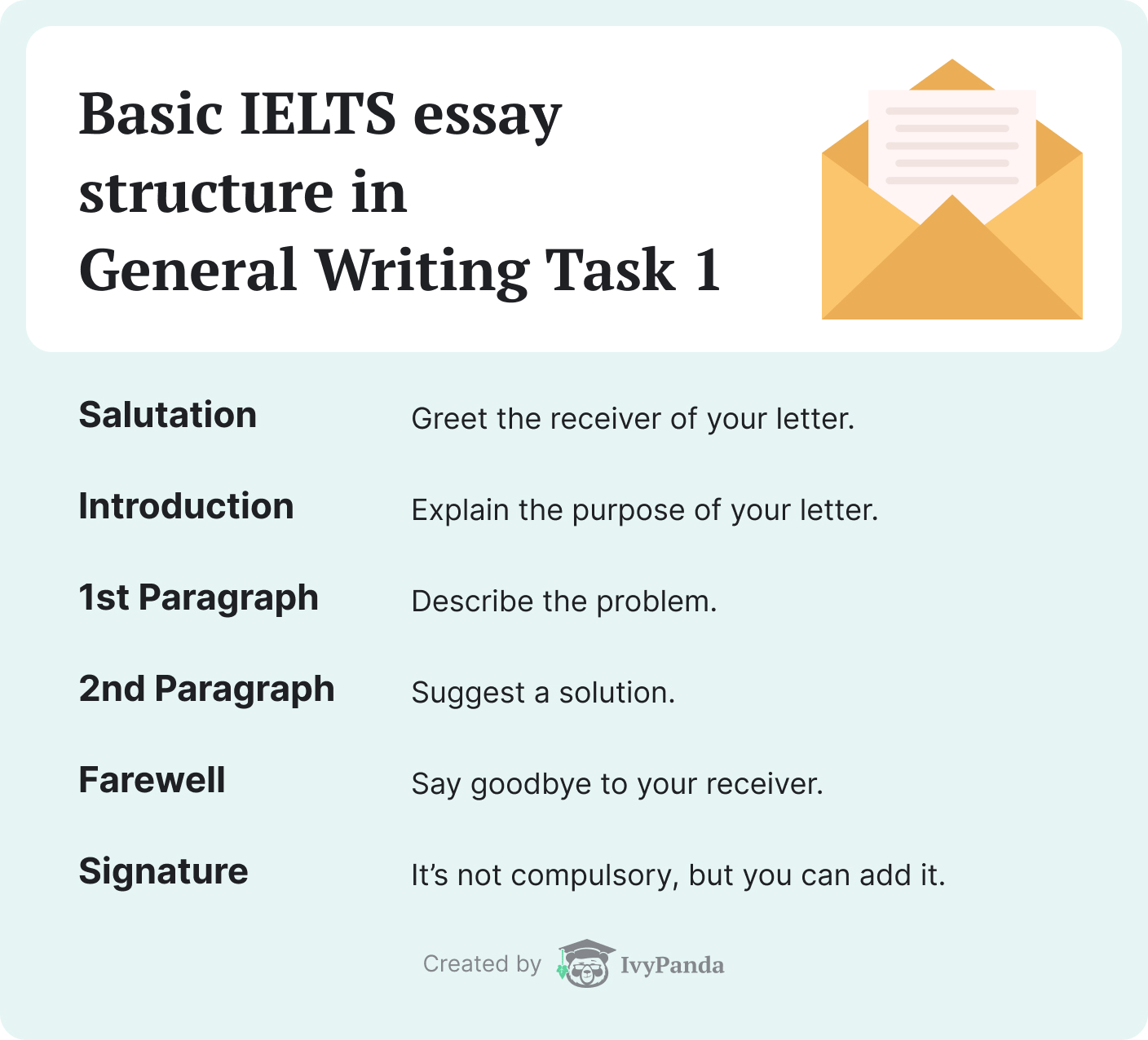
Wondering what are the types of letters that might be given in General IELTS writing task 1? There are only three options:
- Formal letter. You address this letter to an official representative of some organization. You don’t know this person, so you should write formally.
- Neutral/semi-formal letter. This type of letter is addressed to someone you know; however, the receiver is not a close person. It can be your employer, for example.
- Informal letter. It is a letter for someone you know personally (to a friend, relative, classmate, etc.). Here, the tone of your message should be warm and friendly.
Writing any letter relies on the same strategy and IELTS essay structure for task 1. That’s what you should do to nail the task:
- Start with a greeting.
Always greet the receiver and put a comma after the salutation. The greeting is different for every type of letter:
- Explain the reason for writing.
Introduce your purpose. Be professional while writing formal and semi-formal letters and use the phrases like “I am writing to inform you…”, “I would like to express my interest in…” For informal letters, apply a friendly tone.
- Write the first body paragraph.
Describe the situation you have got in and outline the problem. Make sure you covered all the bullet points mentioned in writing task 1. Failing to do so, you will lose the marks.
- Add the second body paragraph.
Propose a possible solution to your problem. Here you can ask for help or request some kind of information. Remember to maintain an official tone while creating formal and semi-formal letters and a friendly manner in informal letters.
- Summarize what has been said.
To give a feeling of closure to the receiver, wrap up your ideas in one concise sentence.
- Finish with a goodbye.
The logical ending to any letter is to say goodbye. Again, this part differs for every type of letter. See the discrepancies below:
📊 Academic Writing Task 1
In Academic writing task 1, you should summarize the data presented on the graph, chart, table, or any other graphic image. Make sure that you convey information logically and coherently.
A general IELTS essay structure in Academic Writing Task 1 is as follows:
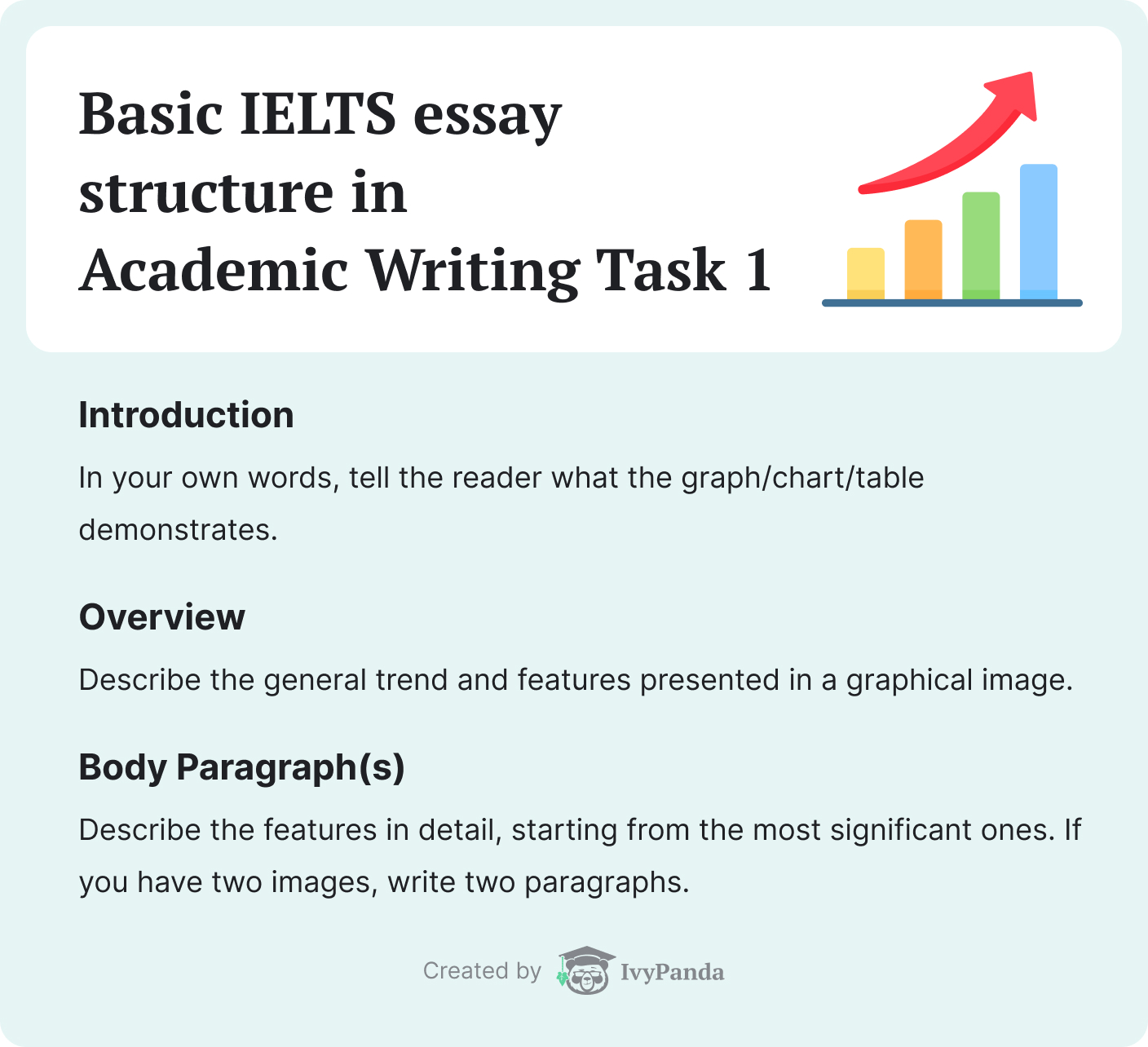
There are several types of essays for Academic writing part 1:
- Pie Chart
A pie chart is presented in a shape of a circle, divided into several sections. At the bottom, you’ll find the necessary information, such as color codes, names of the categories, etc. Attentively explore the pie chart, make sure you understand all the details, and then describe it. - Overtime Graph
Here, you will trace the dynamics of a given phenomenon over a specific period. Pay attention to the labels, the years/months/dates – they can be crucial! The wide range of vocabulary related to change and comparison will make your work professional. - Two Graphs
It is a tricky task since you need to concentrate on two figures simultaneously. Pick the essential info from both graphs, compare and contrast it. Don’t go too far in unnecessary details. - Table Chart
Here, you should catch up with the main trends and present them logically and clearly. Sometimes, it might seem that tables provide fewer data in comparison with pie charts or overtime graphs. So, ensure you have at least 150 words. - Process
The process description is quite an uncommon task for Academic IELTS writing part 1. Yet, there is still a chance you will have it, so be prepared! Here, you will need to present a step-by-step process. To make your essay coherent, use appropriate linking words, such as to begin, then, after that, following this, finally.
Like General Training, Academic writing task 1 depends on the same structure, regardless of the essay type. Here are some tips on conquering it:
- Get the idea of the question. First and foremost, understand what kind of task is given to you. What are the main objectives for the assignment? How can you reach the goal? Don’t try to comprehend the question after you started writing – you will get confused.
- Don’t copy. If you use the words from the instructions, you will lose the points. Try to paraphrase as much as possible. Demonstrate your rich vocabulary and your knowledge of grammar. Also, as you prepare, don’t try to memorize the samples. Firstly, you won’t have precisely the same task. Secondly, the examiner might notice some suspicious similarities.
- Start with general trends. In the single line, describe the whole picture of the chart/graph/table. Don’t try to present all the details at once. Start with a simple and concise overview.
- Gradually go into details. As you described the general trends, you can move to more specific information. But be careful here! Make sure you interpret that data logically and present it clearly. Your essay should be well-structured and easy to read.
- Take a look at examples. You can find those in a free essays database, which is usually filled with papers of every type imaginable. This tip is applicable to dealing with writing task 2 as well.
✍️ IELTS Writing Task 2
Does the IELTS writing task 1 seem difficult for you? Embrace yourself! Task 2 is even more challenging!
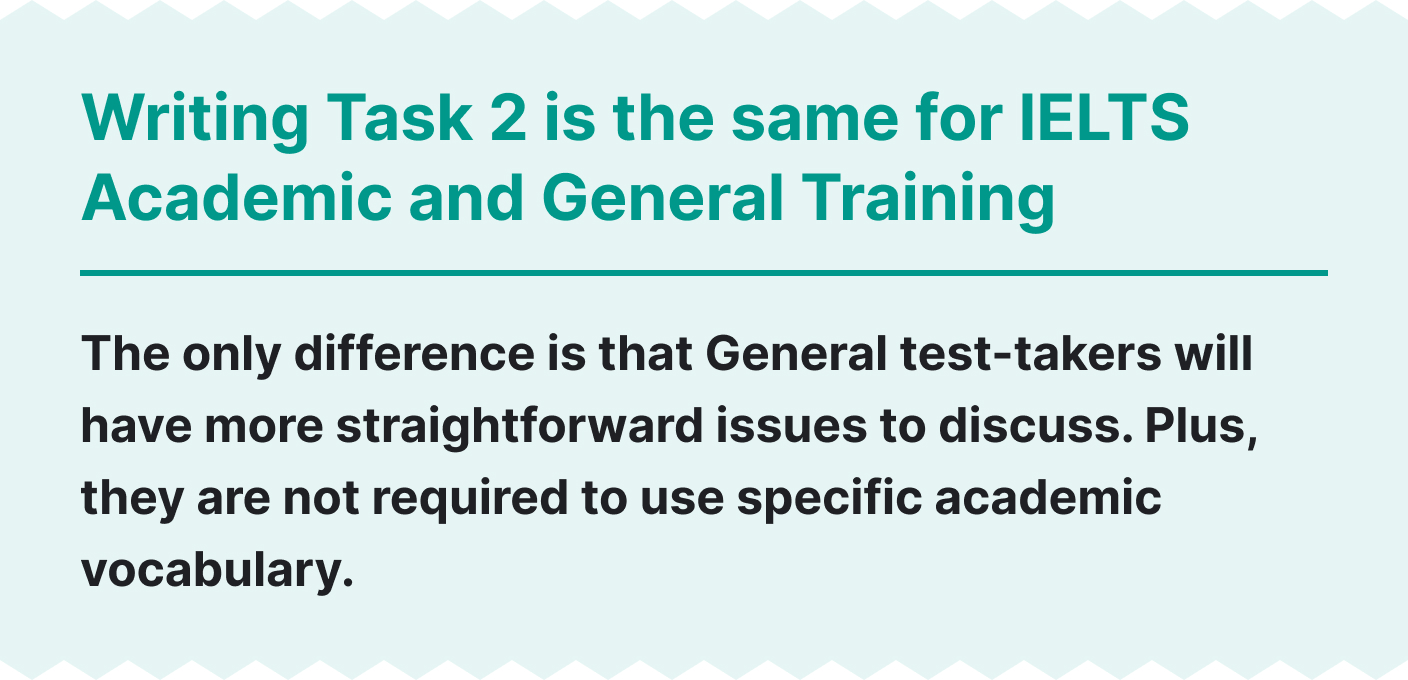
IELTS writing task 2 requires you to compose a formal essay on a given topic. The essay types can be various. The most popular ones are as follows:
- cause and effect,
- comparison and contrast,
- advantage/disadvantage,
- problem-solution,
- agree-disagree.
Other essential information about IELTS writing task 2:
- Estimated time limit: 40 minutes.
- Word count: at least 250 words.
- Grade weight: 66% of total writing band.
- Grading criteria:
- Task achievement – 15%;
- Vocabulary – 25%;
- Grammar – 25%;
- Coherence and cohesion – 25%.
As with task 1, the IELTS essay structure for task 2 is not very type-specific. In any case, you will need to write 4-5 paragraphs connected by one topic and one thesis statement. Your plan of actions should be as follows:
- Inspect the question. Before writing an essay, make sure you fully understand what is expected from you. Search for keywords to catch the main topic. Analyze the instruction to find out what type of essay you need to write.
- Come up with a thesis statement. It should be clear, concise, and correspond to the essay’s topic. A strong thesis statement is a key to a high band. So, spend enough time and effort to develop it.
- Outline your essay. Don’t miss this step! A good outline will help you to compose a well-structured essay and to present your arguments logically.
- Write an introduction. A catchy one will make the examiner interested in your essay from the very beginning, so you increase your chances to get a high score. Put your thesis statement as the last sentence of your introduction.
- Support your thesis in body paragraphs. Devote a separate body paragraph to every idea. Don’t try to include more than one argument in one part – this will make your essay difficult to follow. Ensure you fully covered all the points from your thesis statement in the body.
- Finish with a conclusion. Wrap up your ideas in the last section. It should correspond to the introduction and provide a sense of closure to the readers.
In the following sections, we will dive deep into the aspects of each essay type for IELTS writing task 2.
💭 Opinion Essay
It is a type of essay when you are given a statement and asked whether you agree or disagree. Here, you need to present your opinion and support it with appropriate arguments.
There are several types of opinion essay:
- Totally agree.
- Totally disagree.
- Partially agree or disagree (the question for this type is usually “for what extent do you agree or disagree?”).
Opinion IELTS essay structure looks like this:
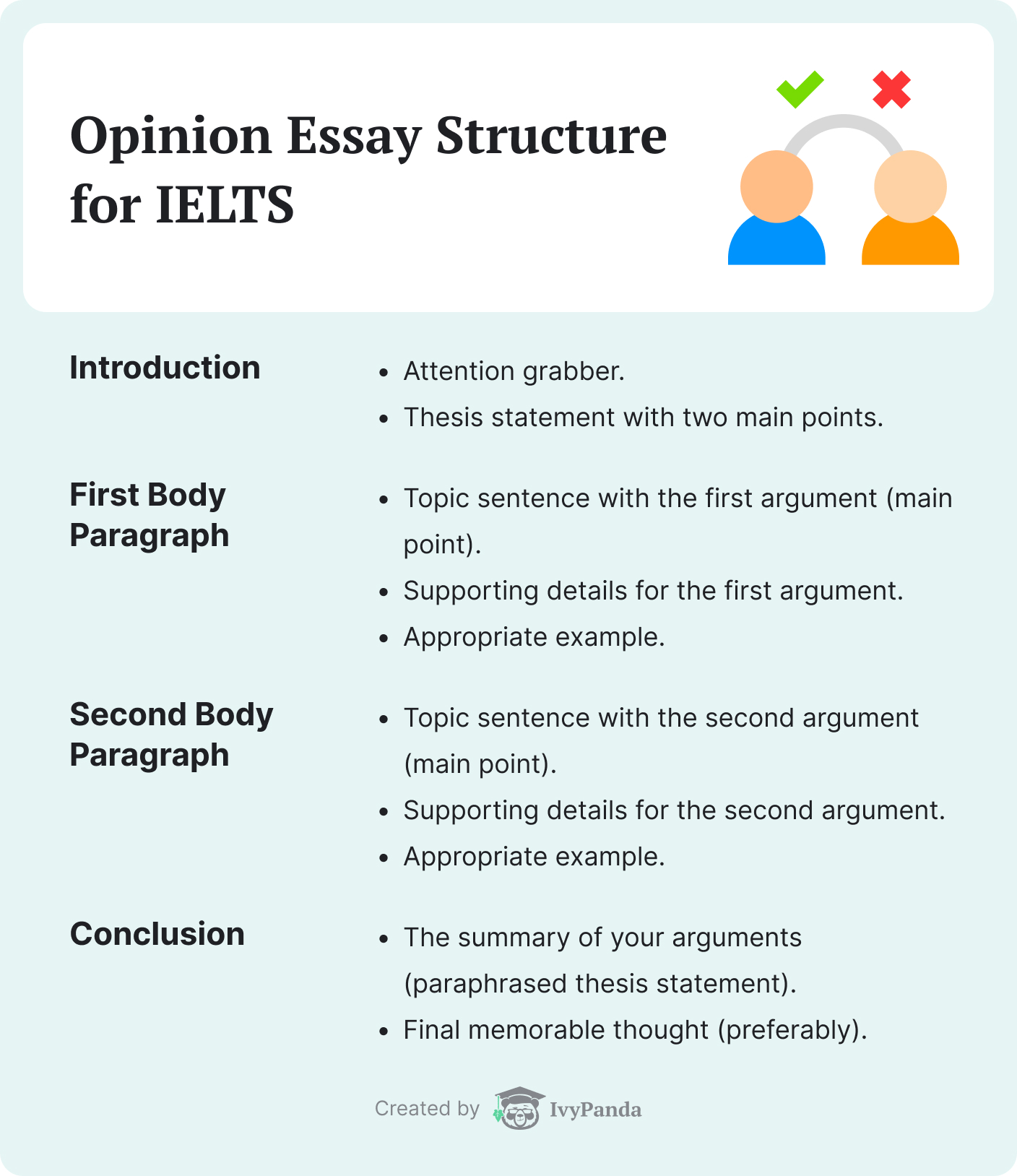
We’ve got even more valuable info for you! Here are some useful tips for creating a successful opinion essay for IELTS:
- Decide on one side of the argument.
- Clearly express your opinion in the thesis statement.
- Stick to your opinion; don’t change it throughout the essay.
- Support your position with solid arguments and examples.
🌟 Advantages & Disadvantages Essay
Pros and cons essay is a prevalent task for IELTS writing part 2. Here, you will need to present the positives and negatives of a particular issue.
There are two types of advantages & disadvantages essay:
- Simple advantage-disadvantage essay.
It aims to present the pros and cons of a phenomenon, event, or idea. For example, possible advantages and disadvantages essay IELTS topic might be the following:
Due to the worldwide Coronavirus pandemic, the majority of organizations shifted to online operations. What are the advantages and disadvantages of remote working?
- Outweigh essay.
Here, your task is to evaluate the benefits and shortcomings of a specific issue and decide whether the pros outweigh the cons. The sample topic for this type of essay might look like this:
Sometimes, students decide to take a gap year after school before entering a university. Do the advantages outweigh the disadvantages or not?
In case you are wondering what the advantages-disadvantages essay consists of, we prepared its structure for you.
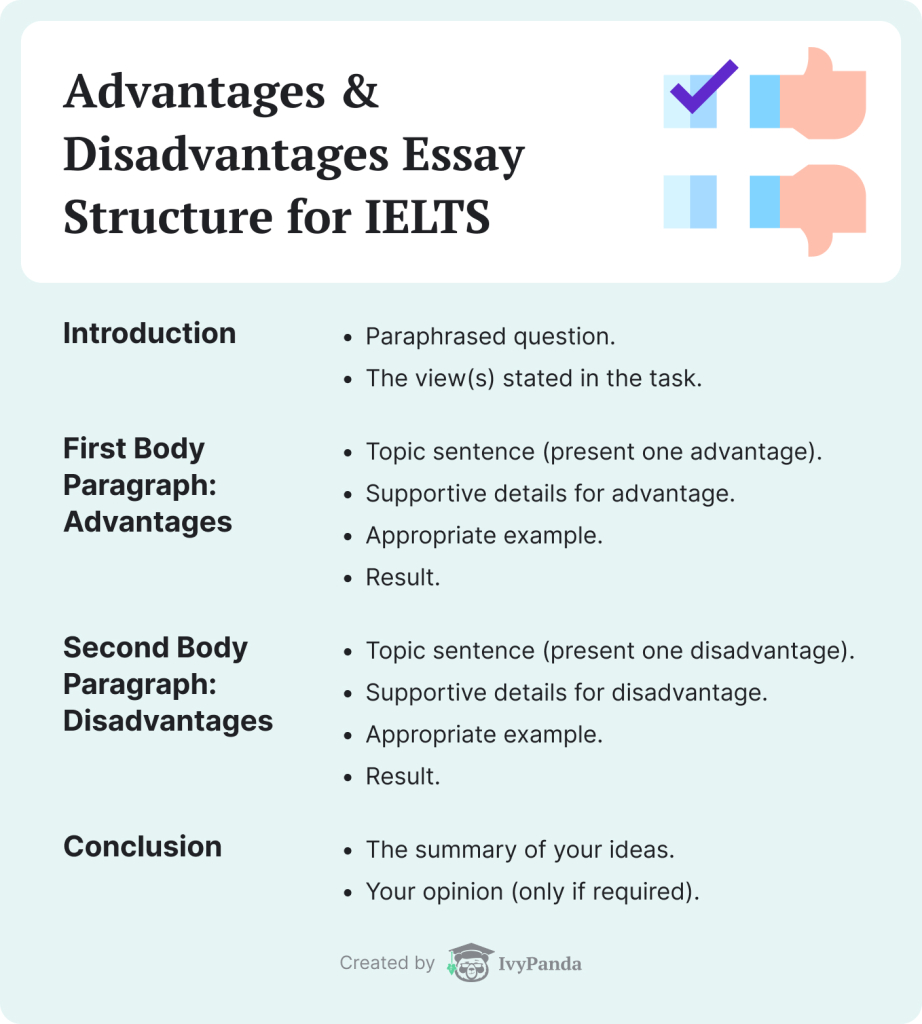
To make your essay writing process easier, we listed some pieces of advice for you:
- Create a thesis statement where you mention both advantages and disadvantages.
- Make sure you have solid examples for your points.
- Chose only one advantage and one disadvantage – you won’t have time to do more.
- Clearly express your opinion, especially if you are writing an outweigh essay.
👍 Solution Essay
With this type of essay, everything is quite simple. You are given a problem, and you need to come up with a solution. There are three main kinds of such essays:
- Solution only essay: you only need to develop an idea of how to overcome a particular obstacle.
- Cause-solution essay: you find out the cause of the problem and suggest a solution.
- Problem-solution essay: you are given a situation; firstly, you should determine the issues it may cause; secondly, you need to offer a solution.
In this case, the IELTS essay structure for task 2 will be the following:
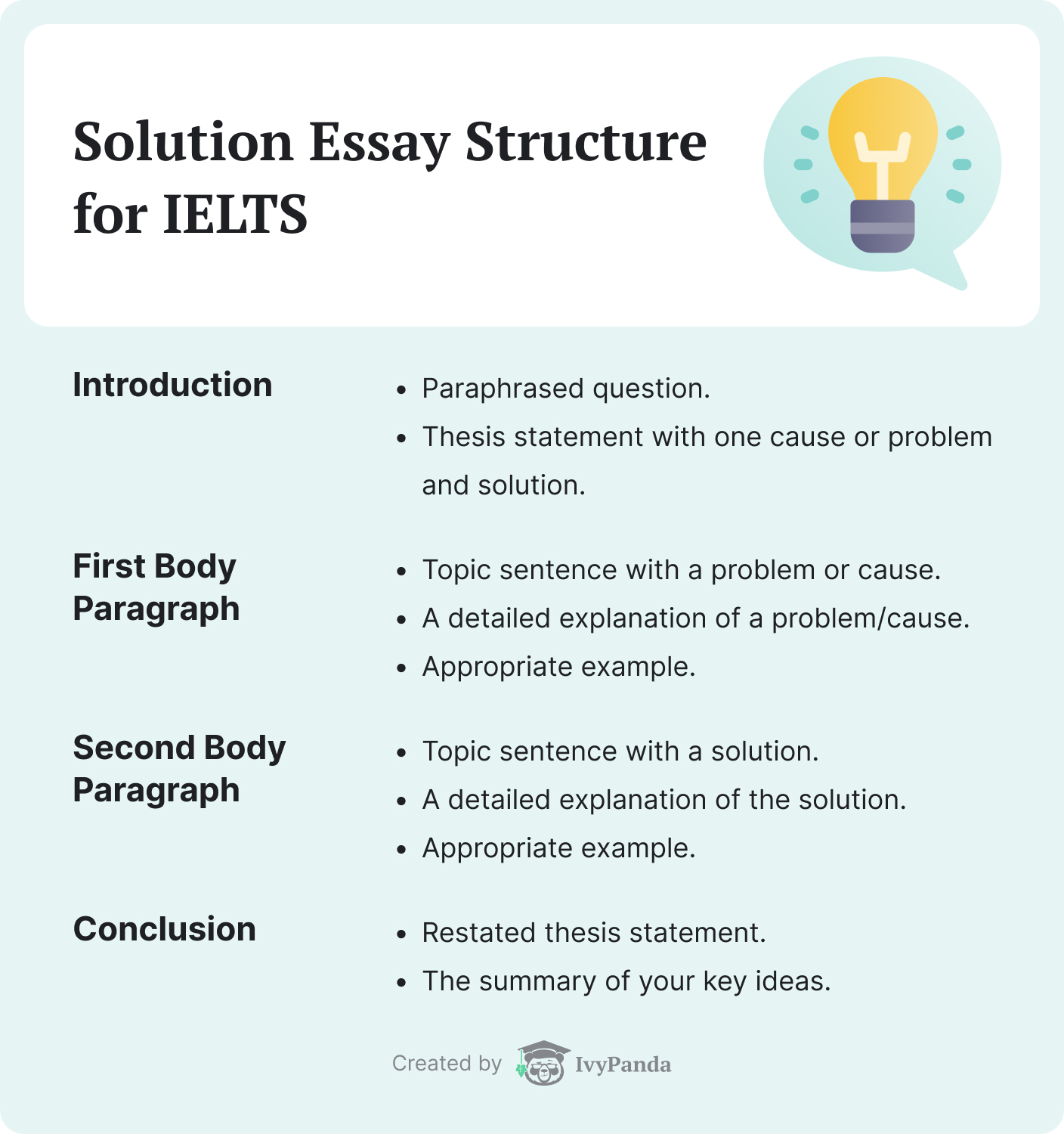
Now, let’s explore some insightful tips for the IELTS essay.
- Quality over quantity: chose a maximum of two problems/causes and a maximum of two solutions.
- Make sure that your solutions correspond to the problems.
- Read the instructions carefully to understand the exact type of solution essay you are expected to write.
🗣️ Discussion Essay
With this type of essay, you will be given a statement. Your task is to analyze the problem and present both sides of the issue. There are two types of discussion essay:
- Two sides of the same problem. For example:
Some people support online shopping, while other people do not. Discuss both sides. - Two different problems. For example:
Some people believe that it is better to have a well-paid but unpleasant job, while other people think it is more important to have a pleasant job even if the salary is low. Discuss both sides and present your point of view.
Do you need to discuss both views? Your IELTS essay structure should look as follows:
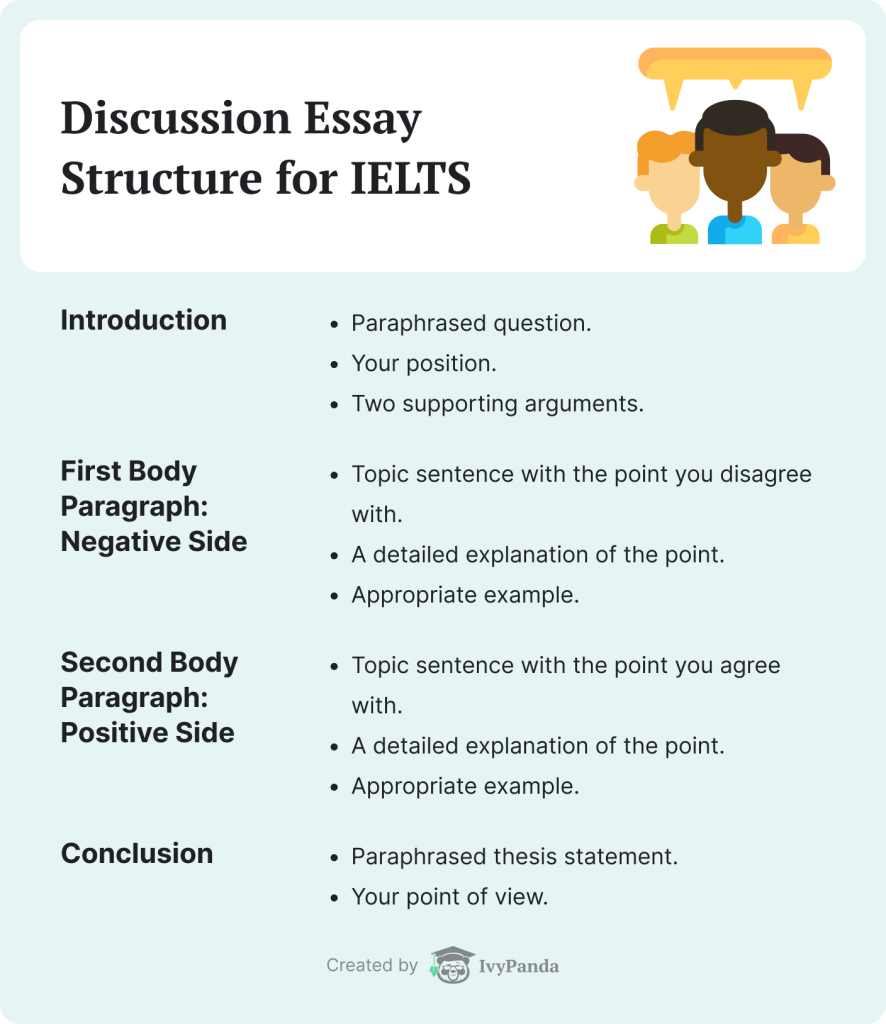
We’ve also got some valuable tips for writing a discussion essay:
- Analyze both sides of the argument.
- Make your body paragraphs equal. Even if you disagree with the point, discuss it.
- Describe the point you disagree with first.
- Express your position as straightforward as possible.
❓ Double Question Essay
This essay type is not very common. Still, you should be ready to face it. A double question essay (sometimes referred to as a “two-question” or “direct question” essay) includes one statement with several questions after it.
There are no specific types of double question essays. Each task may vary in topics and the number of questions. Sometimes, the instructions contain only one question; sometimes, three of them.
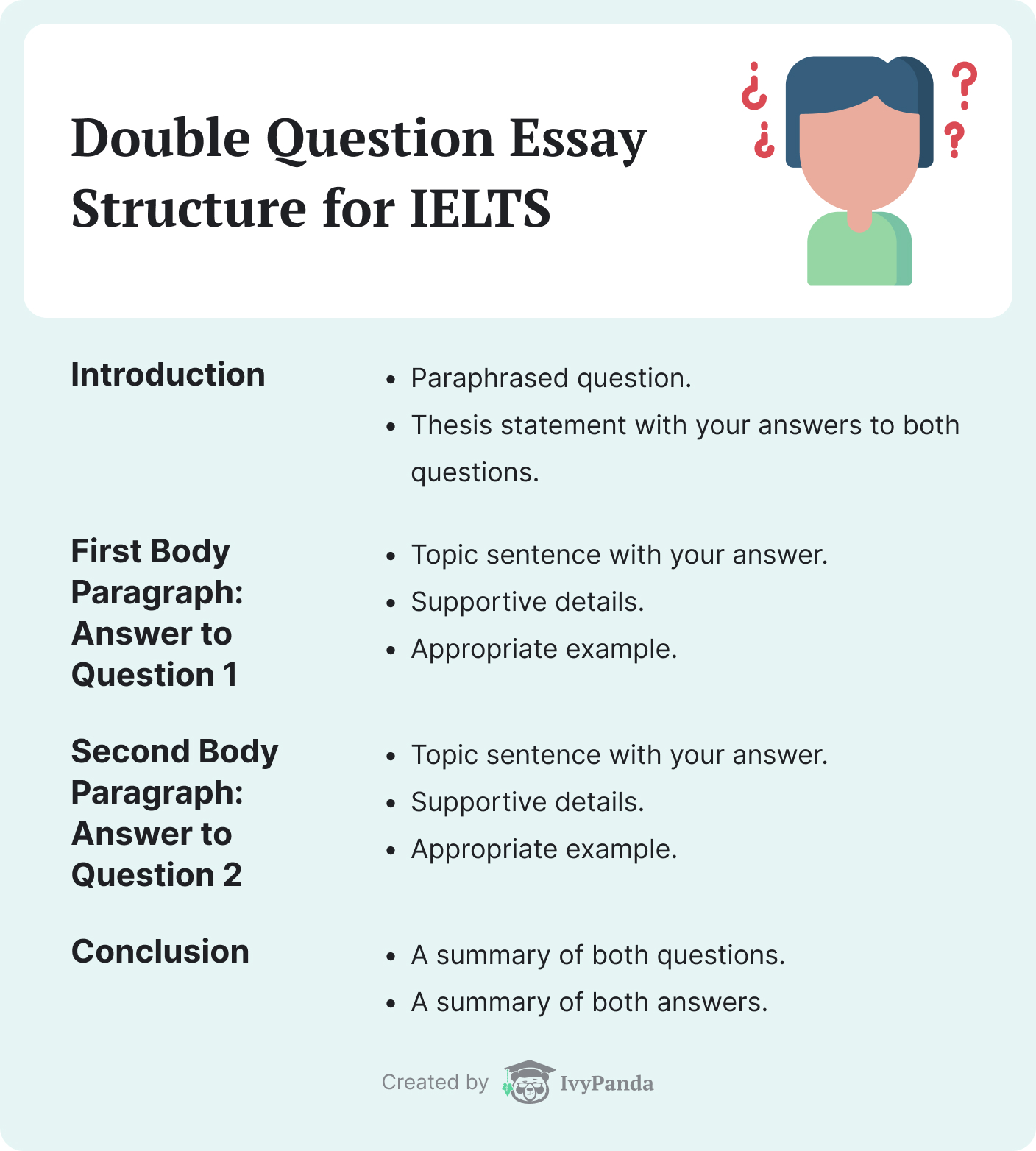
Take a look at our essential double question essay tips:
- Make the body paragraphs equal.
- Make sure to answer every question.
- Be concise – don’t try to come up with as many ideas as possible.
- A double question essay is not an opinion or discussion essay – don’t mix them up.
💡 25 Ideas for IELTS Topics: Task 2
As we have discussed theory, let’s move to the practical part! This section is full of ideas for IELTS topics for task 2.
To practice IELTS writing task 1, visit this website. Here, you will find all the graphs, charts, tables, and schemes necessary for training and learning.
Our essay ideas for IELTS writing task 2 are divided accordingly to the essay types:
⭕ Opinion Essay
- The rapid globalization of the world leads to the loss of cultural diversity. To what extent do you agree?
- Some people consider men and women as equals; thus, women can handle any job. Other people believe that some jobs are not suitable for women. What is your opinion?
- Violence in social media is a direct cause of violence in society. To what extent do you agree?
- Sex education should be a compulsory subject in high school. Do you agree or disagree with this idea? Present your own opinion.
- Education is a basic human right; however, since it is expensive, not everyone can afford it. Therefore, education should be free for everyone. To what extent do you agree?
⭕ Advantages & Disadvantages Essay
- With rapid technological development, e-books have become increasingly popular. Some people find it beneficial, while others do not approve of e-books. What are the pros and cons of using them instead of paper books?
- Fast food restaurants have helped people save time and keep up with the high speed of modern life. However, it has harmful effects on human health. What are the pros and cons of fast food? Do the advantages outweigh the disadvantages?
- The trend of taking a gap year between school and college became incredibly popular. What are the advantages and disadvantages of taking a gap year?
- Many families prefer to put older people in nursing homes instead of looking after them at home. What are the advantages and disadvantages of this decision?
- Some people believe that online learning will soon replace traditional schools. What are the benefits of remote education? Do the advantages outweigh the disadvantages?
⭕ Solution Essay
- The rapid technological progress in developing countries is one of the leading causes of global warming. What is the possible solution to this problem?
- Cyberbullying has become a serious problem the majority of children and teenagers face nowadays. How can parents prevent their children from cyberbullying? Suggest some solutions.
- Overpopulation of the urban areas leads to a number of problems. Least several of them and come up with effective solutions.
- Due to the low wages in developing countries, people migrate to developed countries for work purposes. What are some problems of this tendency, and what solutions can you suggest?
- Since children spend too much time on their smartphones, they do not lead an active life. What problems can a sedentary lifestyle cause? What can be done to solve this problem?
⭕ Discussion Essay
- Some people think that music classes should be compulsory at school. Others believe that parents must decide themselves whether they want their children to take them. Discuss both points of view.
- If some people believe that environmental problems should be solved locally, others claim that there should be a global approach to such issues. Discuss both sides and express your own point of view.
- Some people believe that the death penalty is too cruel, so it should be banned. Others state that it is a fair punishment. Discuss both sides.
- Some people think that a high-quality university education guarantees employment. Other people believe that work experience is a key to getting a job. Discuss both points of view and express your own position.
- One group of people claim that life in a big city is more convenient. In contrast, another group states that it is better to live in the countryside. Discuss both points of view.
⭕ Double Question Essay
- Fake information often spreads around the Internet. Have you ever been a victim of fake news? How to distinguish reliable sources of information from unreliable ones?
- Numerous people agree that it is impossible to buy happiness for money. What is your opinion regarding this issue? Is money an essential element of a happy life? Can a rich person be unhappy, and a poor one be happy?
- In schools, intelligence is often measured by school grades. Is it the right approach? Do school grades always reflect the person’s real level of intelligence?
- With the development of the Internet, people gained more opportunities. In what ways has it improved our lives? What are the most crucial benefits of the Internet?
- Travelling expands the horizons. How do you interpret this phrase? In what ways can trips be beneficial for people? What knowledge can you gain while visiting new countries?
👩🏫 IELTS Writing Tips: Academic Style
We have discussed each essay type separately. Yet, there is one more aspect that is worth mentioning – academic style. It should be applied to every IELTS essay (except informal/semi-formal letters in task 1). In the following section, we will discuss the academic style features you should consider while completing the IELTS writing part.
While composing an essay for IELTS, make sure you meet the following requirements:
- Avoid slang. Don’t include words like wanna or dude in your essay. Write in clear English.
- Construct full sentences. Make sure you have an independent clause with a subject and verb in every sentence.
- Avoid redundancy. Repeated terms and ideas will demonstrate your poor vocabulary. Make sure you use a wide range of words.
- Follow an IELTS essay structure. Allocate separate paragraphs for each of your ideas. Don’t try to put more than one argument in a section. You will only confuse your reader.
- Use a neutral tone. Maintain a calm and thoughtful tone throughout the entire essay. Don’t go to extremes. For example, instead of saying: I can’t stand villages, say: life in the countryside has a number of negative aspects.
Thank you for visiting our page! We hope our comprehensive guide was helpful. Share it with your friends who are going to take an exam as well. And good luck with IELTS writing!
🔗 References
- IELTS (International English Language Testing System): Test Format – Cambridge English Assessment
- IELTS Academic Writing Test Preparation: Question Types – IDP IELTS
- Academic Writing Test – Take IELTS, British Council
- IELTS Test Format: Listening, Reading, Writing & Speaking – IELTS Canada Test, IDP Education Canada
- Academic Writing Introduction – Purdue Online Writing Lab, College of Liberal Arts, Purdue University
- English Language and ESL Resources – UsingEnglish.com
- Academic Writing Style: Organizing Your Social Sciences Research Paper – Research Guides at the University of Southern California
- Style – The Writing Center, the University of North Carolina at Chapel Hill
- Tips on Grammar, Punctuation and Style – Kim Cooper, the Writing Center at Harvard University
- 5 Steps to Improve Writing Skills – Teresa Marie Kelly, MAT, Purdue Global
- English Skills – Writing@CSU, Colorado State University



